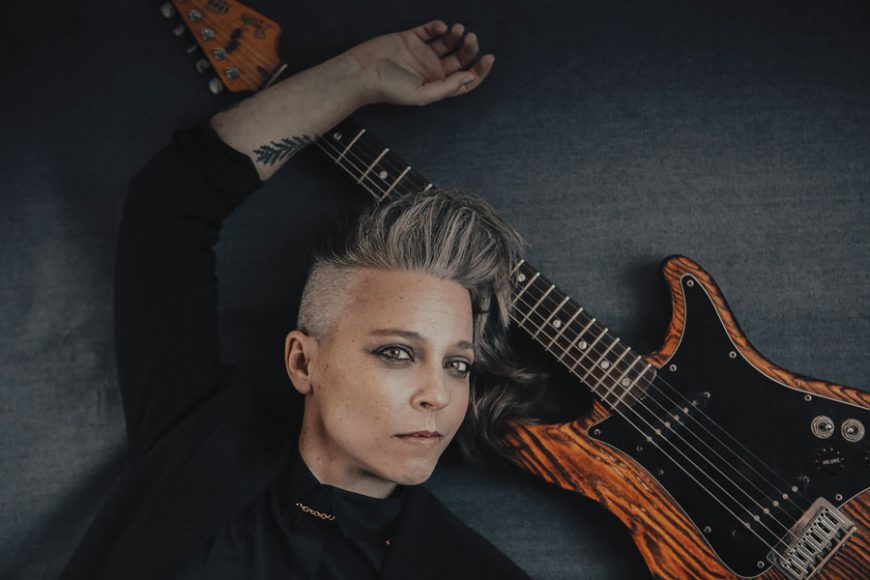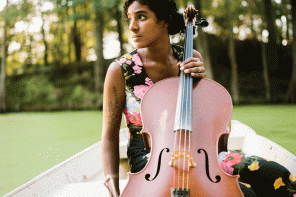Since the late 1990s, singer/songwriter Erin McKeown has been making a name for herself as a distinguished performer with a rich and pure distinctive vocal style.
McKeown expanded her creative horizons with the stage musical “Miss You Like Hell,” a collaboration with Quiara Alegría Hudes, for which she wrote the music and lyrics. As you can hear on “Miss You Like Hell: Original Cast Recording” (Ghostlight), the play is about the reunion of Beatriz (Daphne Rubin-Vega), an undocumented immigrant who is facing the prospect of deportation, with her teenage daughter, Olivia (Gizel Jiménez), and the ensuing eye-opening road trip on which the pair embark. We recently spoke with McKeown about her work and the show, which will be presented at The Play Group Theatre in White Plains from April 7 through 14.
Erin, you collaborated with Tony- and Pulitzer Prize-winning playwright Quiara Alegría Hudes on “Miss You Like Hell,” which premiered at the LaJolla Playhouse in LaJolla, California, in 2016, followed by an off-Broadway production in 2018. How did that collaboration come to be?
“It came in a really cool way, actually. One of those things that’s kind of an unpredictable sum of all the relationships you’ve had before. I made a record called ‘Hundreds of Lions’ in 2009. Quiara had written a play around the same time called ‘26 Miles.’ A couple of years later, she decided she wanted to make that straight play into a musical. She asked friends of hers for names of some female singer/songwriters to whom she should be listening. Her best friend from growing up went to college with me (at Brown University), though I didn’t know her personally. I was known on campus for making music. This friend of hers put my name on a list and gave it to Quiara.
“At the time, ‘Hundreds of Lions’ was new. She heard that record and thought that’s what she wanted the musical to sound like. She wrote me an email through the catchall email on my website, which is generally filled with spam, but her email came through. It said, ‘From one Brown grad to another, I have this play that I want to turn into a musical. By the way, I have a Tony (Award) and I’m a serious writer.’ That’s how it happened! I’d never gotten an email like that in my life. I answered it and she came to see my show in New York the next day. We had lunch and she gave me the script of the play and I just said, ‘Yes.’ I had no idea that it would be a seven-year process.”
The timely subject matter couldn’t have arrived on stage at a more opportune moment. Can you please say something about that?
“For folks that are undocumented and for people who care about our immigration system, this is something that’s been going on for a long time. For a group of people, me included, it’s been very important for a long time. It’s been said before, and it’s always important for me to say when addressing this topic, Obama was not that great on immigration. He deported more people than any previous administrations. For various reasons there wasn’t any legislation that was able to move forward. He’s not Trump.”
He doesn’t get a pass either.
“That’s correct. This is an issue that I care about and am interested in and obviously Quiara cared about it. That’s the thing we added to this story in 2011. There’s no citizenship issue in the play. The mom in the play is Puerto Rican and therefore an American citizen. When we turned it into a musical, we introduced the immigration piece of it. I can only say that that happened because it was important to us, not because something was happening in the news. Then it became news and was growing in waves.
“I think it cuts both ways, to be totally honest, with this show. I don’t necessarily think it’s a blessing to be putting this show out at the same time as we have this person in the White House putting out the kind of rhetoric he puts out. In one way, it’s super important that we are here, telling the kind of story that we’re telling, in some way pushing against that tide. In other ways, in my personal opinion, there’s also a type of fatigue or desire to look away because what we’re seeing in the news is so difficult. Many people look to entertainment for some escape and we’re not offering that. We’re offering people a chance to look more closely at something that’s difficult, to open their hearts to something that’s difficult. I don’t think everyone wants to do that.”
Do you see it as being on par with the protest music of the 1960s?
“Absolutely. I see it something that we had to make and there’s no way that we would not make it, regardless of what’s happening in the political landscape. We were compelled and we made the show we wanted to make and it says the things we wanted it to say. In that way, it’s inevitable and we are compelled by it. When we look back at these Trump years and we ask ourselves, ‘What did we do to help?’ I will proudly say we made this show.”
What are the challenges and rewards of writing songs for others, especially characters in a play, to sing, and how do you think that having written for the stage will affect your songwriting for your own recordings and performance?
“The challenges for me were mostly in the length of the project and the amount of revisions. Music is on such a shorter cycle and there’s a kind of elasticity and looseness and nightly reinvention. Theater is a different animal. I’ve never revised anything as much as I revised and continued to chip away at this project. It was a personal thing. The reward is that I think we were able to make something that is extremely rich and has a ton of depth that comes from spending that much time on something. It was a great lesson.
“Everything I make after this musical will certainly be impacted by that. I have learned to sit with something longer. I have learned to give more time and space to something. I can still write a quick song, if I have to. But I’ve really seen the benefits of this kind of marination and slow edits. I also loved writing for other characters, which wasn’t too far a stretch from the things I’ve been making for years. Even though I may use an I or me pronoun, I’ve been writing about other things and perspectives within my work. I enjoyed the distance of getting to physically sit between 10 and 100 feet from my music. To have it come out of someone else’s body and feel the reflection of that, rather than having to produce it myself, was inspiring and enlivening.
“If my goal is to help connect people, I have an opportunity to connect more people if I don’t have to be personally involved. That’s the thing about which I feel most excited about this phase of the show. I don’t have to be there for it and people can carry this show and this message like little seedpods that get to disperse. There’s a lot of openness and flexibility for the people performing this music and plenty of room for a performer to make each of these songs their own. That’s always a style I’ve been interested in. Not only do I not have to be there, but there’s room for any of these individual performers doing this show to bring their self to it.”
I’m so glad you mentioned that because I was wondering what was it like to have Daphne Rubin-Vega, who made her Broadway debut as Mimi in “Rent,” singing your songs?
“Oh, goodness. That has been one of the hugest gifts for me. I could talk about her for 100 years and not be finished with the depth of her artistry and her intelligence and the things that she brings and does as a musician that I’ve never heard anyone else do. She is a legend, but maybe to a smaller group of people than she should be. She’s a transformational performer and it’s been a joy to collaborate with her in the way that we have. A production of this show is going to be running in Boston. It’s the first time that someone other than Daphne has played Beatriz. She has been with us from our very first workshop and through every workshop, production and rehearsal. Beatriz is a creation of Daphne and me and Quiara. She’s right in there with that. Maybe it’s basic of me to say this, but I wish more people knew about her. She deserves that.”
Do you foresee writing more for the stage?
“Yes, in February, I actually had a workshop reading of a new musical for which I wrote book, lyrics and music. I’m already on my way with a new musical project.”
Is there a new Erin McKeown album in the works?
“Yes, there is. Given what I learned from ‘Miss You Like Hell,’ I’m going to let it take the time it’s going to take. I started working on it and I know what it’s about. I’m super-excited about it and it’s personal. In some ways I have worried in the past that people wouldn’t be as interested if I just kept writing about myself, that somehow I needed to be doing stuff in service of other people’s stories. I have been able to do that with this musical and it’s been great. But my roots are excavating my own biography and my own self to make music, so I’m working on a project that returns to those roots.”
“Miss You Like Hell” runs April 7 through 14 at The Play Group Theatre, 1 N. Broadway in White Plains. For tickets and more, call 914-946-4433 or visit playgroup.org.




